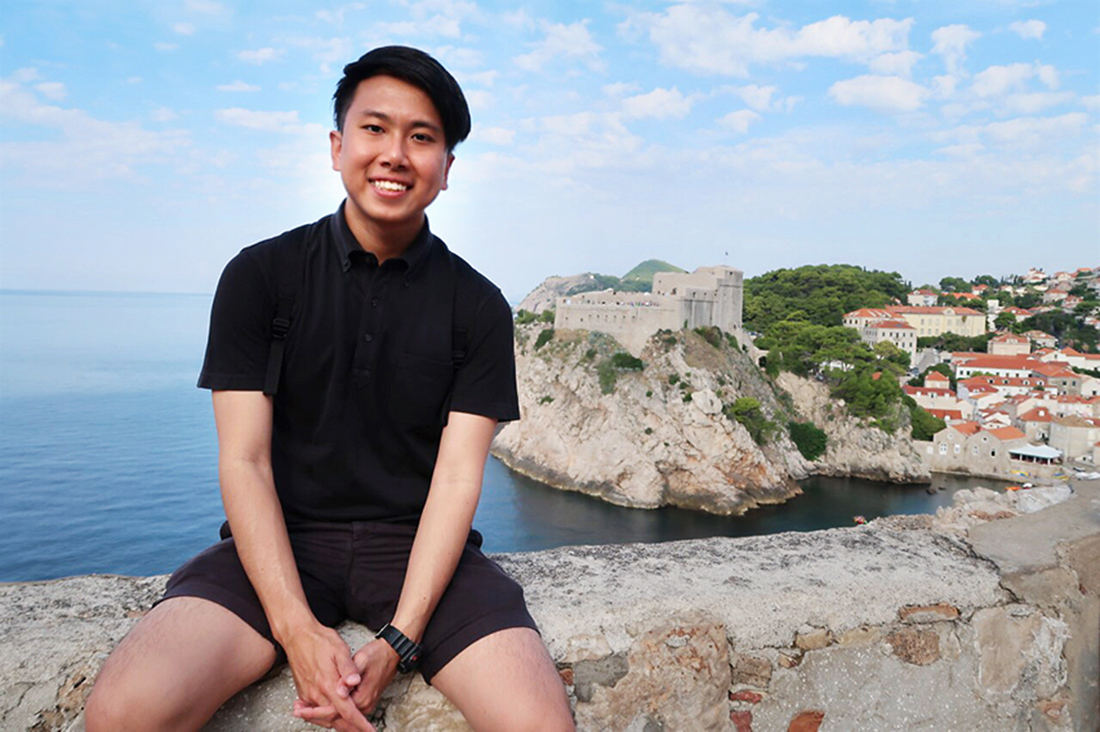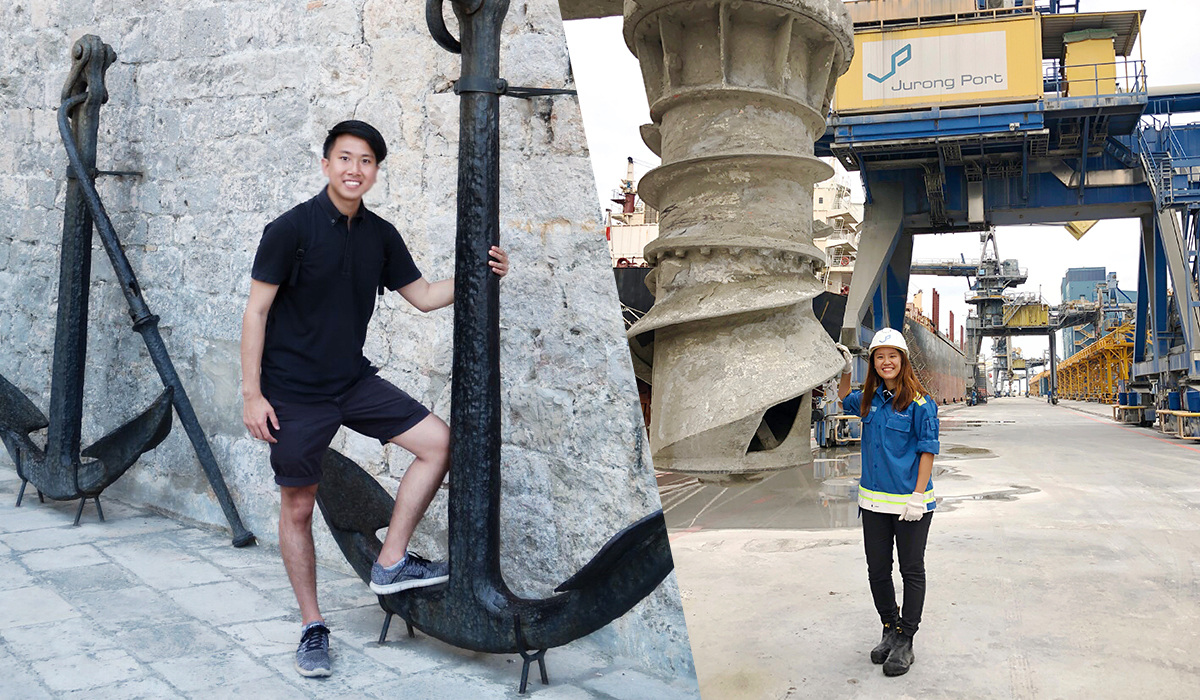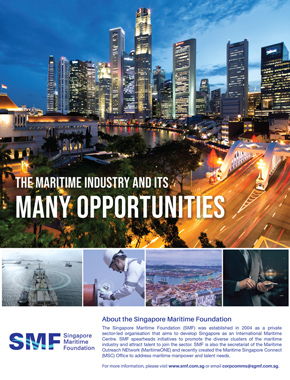Established to forge dialogue and cooperation between private and public maritime stakeholders, the Singapore Maritime Foundation (SMF) sets its sights on helping Singapore become an International Maritime Centre (IMC) by working closely with stakeholders across various segments of the industry, including the marine, shipping, port, and ancillary services. By fostering a strong maritime community, SMF aims to generate shared ideas and initiatives to push the industry forward. MaritimeONE scholars, Marcus Poh, 25, and Lim Ying Xuan, 22, tell us more about their scholarship experiences as they journey towards an exciting career in the maritime industry.
What was your motivation to pursue the MaritimeONE Scholarship?
Marcus: I was impressed at how the scholarship programme offers multiple opportunities for scholars to connect with industry leaders through networking events and dialogue sessions. Additionally, what sets the MaritimeONE scholarship programme apart is that industry players come together to invest in the next generation of talent through the programme, which reflects the collegiate nature of the industry.

Reaching new heights on Trolltunga in Odda, Norway
Lim Ying Xuan
MaritimeONE Scholar
(Jurong Port)
Bachelor of Science (Maritime
Studies with specialisation in
International Trade)
– Nanyang Technological
University
Ying Xuan: Prior to my studies, I had limited Maritime knowledge but was intrigued to learn more about how this industry plays a vital role in sustaining Singapore’s economy, especially in port operations. After gaining a deeper understanding of this sector in my first year of NTU Maritime Studies, I was motivated to pursue the MaritimeONE scholarship as I wish to be part of this essential ecosystem.
What are the development opportunities that you enjoy as a scholar?
Marcus: There is a myriad of opportunities for academic and professional development. These include attending networking sessions, career workshops, and talks hosted by the Singapore Maritime Foundation. We also get the chance to visit maritime locations such as the port and maritime companies, to understand what the industry is all about and see it in action for ourselves.
Ying Xuan: The scholarship has provided me with a head start in career development where I could secure an internship with Jurong Port to gain real world experience. There was also exposure to exclusive networking events and company visits, where I was encouraged to step out of my comfort zone to engage in professional interactions confidently and build valuable connections with industry partners. Moreover, the enriching learning journeys organised by the SMF for scholars helped to develop our skill sets and knowledge beyond the classrooms.
What are some of the things you’ve picked up in your field of study that will help you to excel in your future career?
Marcus: The broad-based maritime studies programme has equipped me with effective problem-solving skills as well as good time and task management. These soft skills are essential in a dynamic and fast-paced industry, where it is important to make sound decisions swiftly.
Ying Xuan: Maritime studies has equipped me with critical thinking and problem-solving skills through the varied research projects, where I have to constantly challenge myself to come up with creative solutions for current issues. Adaptability is another skill that I have gained while dealing with unfamiliar situations, and this is applicable in our dynamic and volatile industry.
What are some of the takeaways you’ve had from the exposure you have received as a scholar?
Marcus: I was fortunate to land a summer internship with Transport Capital Pte Ltd (TCPL), an investment management and advisory firm focusing on international transportation industries. The internship was challenging and gave me the chance to try out different departments in the organisation, exposing me to areas of ship financing and Floating Storage Regasification Unit (FRSU) market research. I learnt the importance of liaising regularly with commercial and technical companies that managed assets under the case of TCPL, and had the fascinating opportunity of boarding a container vessel to check on compliance and regulatory requirements.
Ying Xuan: The exposure gained from this scholarship has been valuable as I had the opportunity to go on a sponsored semester exchange to BI Norwegian Business School in Norway, where it allowed me to visit the Port of Rotterdam and Port of Hamburg, as well as travel around Europe. This enriching experience would not have been possible without the MaritimeONE scholarship.

Marcus Poh
MaritimeONE Scholar
(K Line)
Bachelor of Science
(Maritime Studies)
– Nanyang Technological
University
What are some of the unexpected things you’ve learned about the maritime industry during your scholarship?
Marcus: I was pleasantly surprised to learn that the success of the maritime industry not only requires outstanding talent and a comprehensive range of maritime services, but also, the government’s foresight in the development of the nation’s maritime infrastructure. This is evidenced in the upcoming Tuas Mega Port, where Singapore had already been looking into its development many years before.
Ying Xuan: During my internship with Jurong Port, I was attached to the Operations Department to gain practical experience observing various operations involving the discharging of livestock (pig) shipment, luxury vehicles, prefabricated prefinished volumetric construction (PPVC) and SMRT train carriages. These operations provided an eye-opening experience as such were cargo that I could relate to on a day-to-day basis being transported through our multipurpose port.
What skills do you think are useful to carve a path out in the maritime industry?
Marcus: The essence of the maritime industry is in its people, and having strong communication and critical thinking skills are essential in carving a path in the industry. Being able to communicate effectively helps in forging strong relationships with partners and stakeholders, which helps in commercial activities such as negotiating charter parties or marine insurance contracts. Possessing critical thinking skills is necessary when tasked to make sound decisions in areas such as ship operations.
Ying Xuan: With the Maritime industry moving into an age of digitalisation, it is imperative to not only possess Maritime related knowledge, but also capability in adjacent areas of expertise such as IT and data analytics, to contribute to the industry’s emerging developments. It is also crucial to be adaptable and build strong analytical skills to embrace changes and challenges along the way, keep up with market trends and seize the right business opportunities.


